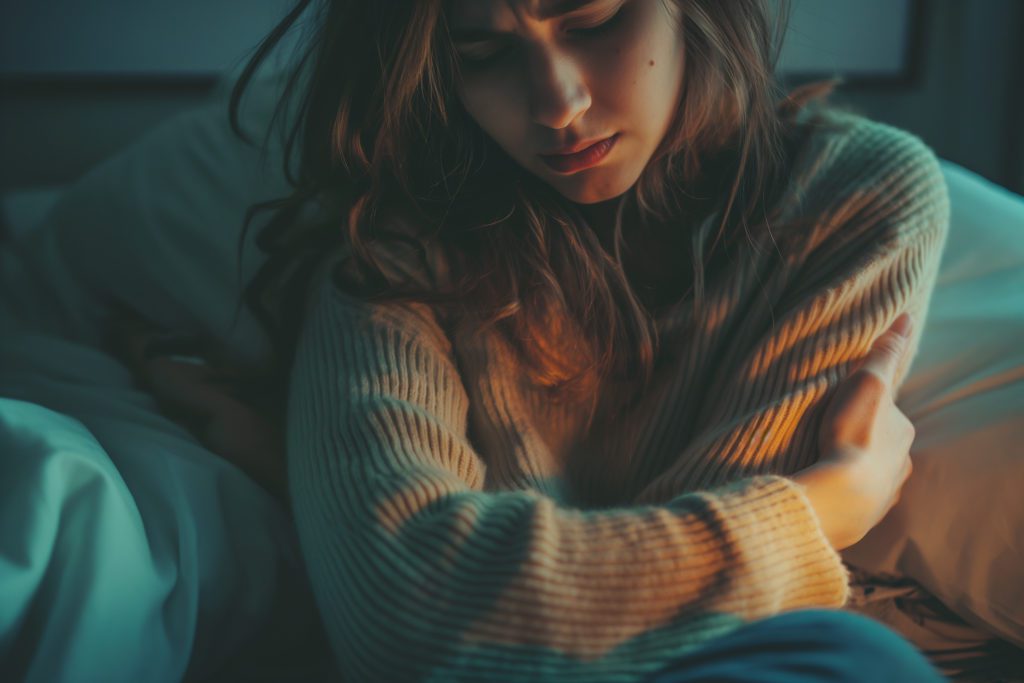
Eating Before Bed: How Late-Night Snacks Affect Sleep and Digestive Health
Most experts advise against snacking before bed, especially on foods high in fat as this can interfere with digestion and sleep.

For many people, a late-night snack before bed is a must. However, you might have heard warnings that it’s not a good idea to eat before bed, that it can interfere with your sleep or digestion. And, now you are wondering if you should give up your bedtime snacking habit.
So, what is the truth? The truth is that you should avoid eating large meals before bed, if possible. But, if you are hungry, you can have a small late-night snack, as long as it doesn’t interfere with sleep.
Here’s what the science says about late-night snacking and what effects it can have on your sleep.
Late Night Snacking And Digestion
It takes several hours after you eat for your body to digest food. This process is much harder when you are lying down. Additionally, the digestive process increases your metabolic rate and body temperature, both of which can interfere with sleep. If you tend to eat high-fat or heavy foods before bedtime, it can prolong digestion, further interfering with sleep.
Eating or snacking late at night can cause heartburn or acid reflux. When you lie down horizontally right after eating, it can cause the contents of the stomach to flow back into the esophagus. This can cause an unpleasant burning sensation in your mouth or throat.
Late-night eating also causes indigestion. This can result in symptoms of nausea and stomach pain. It can also make your abdomen feel uncomfortably full or bloated. Eating food that is spicy, greasy, or fatty can exacerbate these symptoms.
The Effect of Late-Night Snacking on Sleep Quality
If you eat or snack close to bedtime on a regular basis and have trouble getting enough sleep, it’s worth exploring whether there is a connection.
Studies have shown that late-night eating can interfere with sleep. One study found that when participants ate within three hours of bedtime, they experienced low-quality sleep and woke up more during the night. Another study, published in the British Journal of Nutrition, found that eating or drinking within an hour of bedtime increased the risk of waking up shortly after falling asleep, leading to poor-quality sleep.
Eating interferes with hormones that are involved in sleep. It can delay the release of melatonin, which can keep you from feeling sleepy. Eating also triggers the release of insulin, which is a hormone that helps your body use food for energy. Insulin can interfere with your body’s circadian rhythm or 24-hour sleep-wake cycle by telling your brain to stay awake when it should be asleep.
Eating before bed contributes to acid reflux and indigestion, both of which can impact sleep. You might be experiencing micro-arousals and not remember waking up. But, the symptoms can interfere with your sleep nonetheless. This could cause you to wake up in the morning feeling groggy and poorly rested.
What To Do If You Are Hungry Before Bed
You shouldn’t go to bed hungry. Snacking isn’t really recommended before bed, but it will be hard to fall asleep with a rumbling stomach. So, if you are really hungry, have a light snack.
Choose easily digestible, nourishing foods that have a high concentration of melatonin like tart cherry juice or kiwis. Nuts and seeds are also good choices as they are high in tryptophan, an amino acid that can help promote sleep. Greek yogurt is another good choice, as it’s high in protein, which can help you feel full making it easier to fall asleep.
Avoid snacks that are high in fat like ice cream or pie. Also, stay away from spicy foods. All of these can cause you to wake up during the night.
Tips for Sleeping Better: Beyond Late-Night Snacks
- Eat dinner at least three hours before bed: Eating a large meal directly before bed can have consequences, such as acid reflux and indigestion. Also, it’s best to give your body at least a couple of hours to digest food before you lie down.
- Avoid eating too early: If you eat dinner too early, you may be ravenous by the time bedtime rolls around. Eating approximately three to four hours before bed is a good timeline.
- Drink a cup of mulberry tea: Mulberry tea is an ideal bedtime drink. Mulberry leaves have a lot of melatonin, which is the hormone that helps regulate the sleep cycle.
- Avoid caffeine or alcohol before bed: Both of these substances will interfere with the sleep cycle.
- Change your bedtime routine: Do you normally eat a bowl of ice cream while watching TV right before bed? Instead, choose relaxing non-food activities that signal to your body that it’s time for bed. Drink a cup of decaffeinated tea, take a bath, or read a book instead. These activities will help you wind down and fall asleep more easily.
- Eat healthy throughout the day: Eating a variety of nutritious, filling foods at breakfast, lunch, and dinner can help you reduce nighttime cravings for junk and carb-dense foods. Also, make sure you are eating enough calories so that you aren’t starving at night.
- Manage stress: Stress and anxiety are two common reasons why people overeat at night when they are not hungry. Practice relaxation techniques like bedtime yoga or meditation. These can help you relax and reduce the need to engage in late-night snacking.
- Keep a sleep journal: When it comes to eating before bed, everyone is different. Some people can eat close to bedtime and have no issues while others will get indigestion or heartburn if they eat after 8:00 PM. To find out what works for you, keep track of your food and drink intake before bedtime. If you notice that you get stomach problems or poor sleep after eating before bedtime, then try skipping your bedtime snack and see what happens.
Final Thoughts
For most people, making simple changes to their snacking habits before bed can help them sleep better. However, if making the above changes doesn’t help, see your doctor because there could be something else going on. They may recommend other lifestyle changes or medications.
FAQ
Are there cultural differences in nighttime eating habits?
In some regions, such as the Mediterranean and the Middle East, late-night meals are common. However, overall diet quality and portion control play a bigger role in health outcomes than just meal timing. Cultural differences in metabolism and activity levels may also influence the impact of late-night eating.
Does meal timing affect sleep quality differently for men and women?
Research suggests that meal timing may impact men and women differently due to hormonal variations. Women may experience greater disruptions in sleep quality after eating late, as insulin and metabolism cycles can be more sensitive to food timing, while men may process late-night meals more efficiently.
Does eating before bed affect blood sugar levels?
Eating late, especially high-carb or sugary foods, can cause blood sugar spikes and crashes, potentially leading to restless sleep. People with diabetes should monitor nighttime eating habits closely to avoid blood sugar fluctuations.
Does eating before bed affect cognitive function and memory?
Late-night eating, especially unhealthy foods, may negatively impact brain function by disrupting sleep cycles and increasing inflammation. Poor sleep quality caused by heavy nighttime meals can affect memory consolidation and cognitive performance the next day, making it harder to focus and retain information.
Can eating before bed contribute to nightmares or vivid dreams?
Some research suggests that eating close to bedtime, especially spicy or rich foods, can increase brain activity and disrupt REM sleep, leading to more vivid dreams or nightmares. However, more studies are needed to confirm this link.
Can eating before bed help with acid reflux if I choose the right foods?
While eating too close to bedtime can worsen acid reflux, choosing the right foods may help. Low-acid, non-spicy, and non-fatty options like oatmeal, bananas, and yogurt may be easier on digestion. Elevating your head while sleeping and avoiding large portions can also minimize reflux symptoms.
How does eating before bed affect hydration and nighttime bathroom trips?
Certain foods and drinks, like salty snacks and caffeine, can cause dehydration or excessive thirst, increasing the likelihood of waking up at night to use the bathroom. Eating too close to bedtime, especially heavy or liquid-based foods, can also contribute to nocturia (frequent nighttime urination).

Written by
Emily Mendez
Emily Mendez is a former therapist and mental health author. She is one of the leading voices in mental health. Emily's writing has appeared in eCounseling, SonderMind, and more. Emily is frequently interviewed by Healthline, Fatherly, INSIDER, Family Circle, and other national media for her advice and expert opinion on the latest mental health topics.
Download Pillow
Get help
Press & News
Legal
Connect
X (Twitter)
Company
Copyright © Neybox Digital Ltd.



